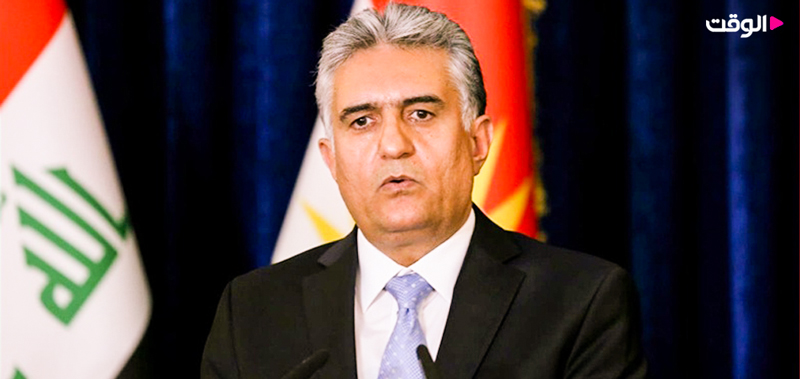Alwaght- After Iraqi Federal Court banned former foreign and finance minister Hoshyar Zebari from running for president on February 13, Kurdistan Democratic Party (KDP) named a new candidate, Rebar Ahmad Khaled, for the president post in Baghdad. Naming this infamous figure for such an important post and his slim chance of success in rivalry against experienced candidates prompts speculations about picking him by the party leader Masoud Barzani.
The Barzani confidante
Rebar Ahmed Khalid was born in Erbil in 1968 and holds a bachelor's degree in civil engineering from Salahuddin University in Erbil in 1997 and a master's degree in national security from the Iraqi National Defense College in Baghdad in 2007. He is originally from Harn village in Barzan and Naji districts of Duhok province. He is the only surviving member of his family which has long been respected by the region's tribal leaders. His family at its entirety was buried alive in mass graves by Saddam regime as part of Anfal campaign in 1980 during which some 182,000 Kurds were killed by Ba'athist regime. He grew up with his mother in plight.
Ahmad Khaled was elected a member of the office for the reconstruction of Iraqi Kurdistan in 1997. He is fluent in Kurdish, Arabic, English, and Persian. Ahmed Khaled is also a military and security expert; from 2000 to 2005, he served Director of Counter-Organized Crimes for the Defense Department of the Kurdistan Region’s Agency, and from 2005-2012, he served as Director of Intelligence Analysis of the Kurdistan Region’s Parasteen Agency.
Generally, Ahmed Khaled is known as a senior intelligence officer in the autonomous region and in Baghdad, but he is mentioned as the confidante of the Barzanis and the government of the Iraqi Kurdistan region, as he has been part of KDP leadership since 1997. Since 2019 he has been serving as interior minister at the Kurdistan Regional Government (KRG).
With these in mind, the KDP named its third-degree politician for the president post. Figures close to the circle of power, such as Nechirvan Barzani, Masrour Barzani, who are basically considered close to Massoud Barzani, were among the first-degree figures who were expected to be named for the presidency. In addition to these people, a group of other members of the party leadership, such as Fazel Mirani, Rowsch Shaways, and Fuad Hussein, are among those who can be considered as the second-degree members of the KDP. But the nomination of a third-rate figure like Ahmad Khaled is a political move to get rid of any pressures concerning the performance of the candidate named by the Barzanis.
The Barzanis are resolved to take revenge on the Patriotic Union of Kurdistan
In all the years since 2005, when Iraq's first national government was formed, the Kurds have held the presidency according to a national Iraqi agreement on distribution of the powers. In 2006 and 2010, Jalal Talabani was elected president without any serious obstacles, according to a strategic agreement between the PUK and KDP. In 2014, Fuad Masum was elected president by agreement between the two parties, but in 2018, after Talabani's death, a great duel took place between the two sides, which, after a great political controversy, finally ended with Barham Saleh of the PUK elected for president by a parliamentary vote.
In the new situation and post-election, the KDP, led by Massoud Barzani, and PUK, led by Bafel Talabani, were expected to reach a deal on a figure. But Zebari nomination showed the KDP has its eyes on the post. After Zebari was banned, the Barzanis were thought to agree with the PUK on a moderate figure from the latter, like Fuad Masum. But nominating Ahmad Khaled demonstrated a KDP resolution to take the post in Baghdad and take revenge on the PUK for 2018 defeat.
Barzani totalitarianism and Kurdish region's movement to single-family rule
The KDP's show of serious spirit of non-compromise to the PUK over the Iraqi presidency is, primarily, indicates its totalitarianism in the Kurdistan region's politics. During all the years following 1991, there has been a distribution of power between the leading parties, regardless of even the election results. But now the Barzanis sound resolved to seize the power in the autonomous region.
Currently, the KRG presidency is held by Nechirvan Barzani, the nephew of Masoud Barzani. Also, Masoud's son, Masrour, is the KRG's prime minister. The Barzanis are dominant in all other political, economic, and military posts. So, with its eyes on Baghdad presidency, Barzani-dominated KDP plans to take its totalitarianism in the Kurdistan region to its highest levels.



























